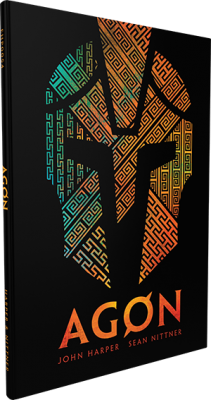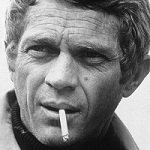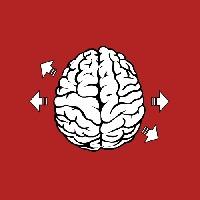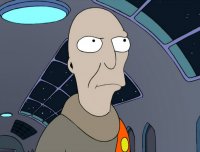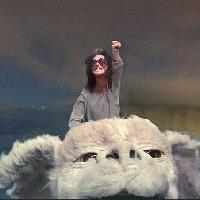This is going to be a review of Agon, the most recent RPG from designers John Harper and Sean Nittner, but first I would like to think a little bit about how RPGs are reviewed. It struck me recently how one sided RPG reviews are.
They come in two main flavours:
- I’ve read this and here is my opinion
- I’ve read and run this as a GM, here is my opinion
I honestly don’t think much of the first type of review, as isn’t very useful to the consumer. It's a product review that doesn’t really tell us how it plays.
The second type is more useful but it is limited by the role the critic has assumed, in this case that of the GM. GM’s tend to be the purchasers of books in a group so this is a useful review for them. I’ve written this type of review.
What we don’t see in RPG reviews as much as I think we should is how a game feels to play from the point of view of a player. As the RPG population grows we are bringing more and more new players to the fold, but we talk about games mostly from the point of view of how they are run. That should change, and I’d like to try to write from that perspective now. I’ve run Agon once, but most of my experience of it is over a multi-session campaign that has just wrapped up. This was run by the excellent Gaz from The Smart Party
Let me now take you on an epic journey amongst islands of mystery, intrigue, and danger. Let us gather round a fire and tell tales of tragic heroes, dark magicks, and capricious deities. We start on the ocean.
Your vessel is a long way from home, returning from a war. Which war? It hardly seems to matter now, these are not the stories of that conflict. These are the stories of heroes trying to find their way home to rest. The gods do not want you back just yet. You are a pebble on the ocean and out from your boat will ripple great deeds, tragic loss, and difficult choices.
 You might start out looking something like this. The current character sheet looks a little bit different.
You might start out looking something like this. The current character sheet looks a little bit different.
As we open our adventure the heroes are defined very loosely. A name and an epithet, I started out as Bloody Minded Titus for instance, a smattering of numbers, and a rough description is all the defines each of our legends. A leader is chosen, the heroes talk of things to come and what has been, bonds are formed. From out of the mist, an Island appears. All is not well.
Each session of Agon revolves around resolving a single island’s problems. Stepping foot on the island you are immediately assailed by choices: help the people out of the way of the rampaging boar, or do you try and take it down yourself? Help the people take on the harpies, go to the temple to determine what has happened to the island’s protections? Binary choices for sure, but each one leading to another set of choices, and another, and another.
In this way the game feels like a sophisticated choose your own adventure, simple points of conflict that present sparks for ideas and expansion. Each choice presents possibilities allowing GM and players to pursue paths without holding ideas too rigidly. As these choices set the heroes down a path the island pushes towards its conclusion in a mighty battle to determine once and for all the fate of the Island. Although the term battle is used, these final denouement may be a debate as much as a sword fight.
 The art is truly exceptional. Each of these images represents one of the islands included in the book.
The art is truly exceptional. Each of these images represents one of the islands included in the book.
Conflict is nothing without the motivation to engage with it and it is here that Agon pulls its best trick. As you play you accumulate Glory for participating in conflicts. Like battles, conflicts could be everything from a straightforward set of fisticuffs to a sophisticated poetry reading, the system is at once tight and loose enough to allow for a wide spectrum. Without participating in these conflicts you cannot gain Glory and without glory you hero will not change and grow, gaining larger sided dice to roll amongst other things. This sounds like it could result in a win spiral, where someone starts winning and then keeps winning because of the first win. The nature of the dice system is such that there is room from frequent abject failure and suffering.
Agon very much believes that as we suffer we learn, and this introduces the other core resource of the game Pathos. It is inflicted on heroes by failure in conflicts, but can also be drawn upon to help succeed, allowing conflicts to be triumphed over when all seems lost. As a hero suffers they eventually fall into agony and start to mark fate. That doesn’t sound like somewhere you want to be, but marking fate allows you to take new abilities, increasing die types amongst other abilities. In this way Agon encourages heroes to engage in conflicts, to not be fearful of failure, to embrace the inevitability of their Fate.
Of course not every conflict suits every hero and you, like our group did, will find different heroes taking on roles that suit their character over the course of your voyage home. Epithets will come and go, I lost Bloody Minded and gained War Leader and Reckless instead (the extra Epithet coming from marking a point of Fate). Even this subtle change can alter the nature of the game as heroes draw on these new descriptions in different ways to overcome the challenges before them. There is a lot of subtle influence in Agon that may not be immediately obvious at first flush.
 Who will you please, and who will you anger. Both are inevitable.
Who will you please, and who will you anger. Both are inevitable.
As the heroes sail away from an Island, before the mist once more envelops their vessel, the heavens shine down upon them, reflecting their deeds in the constellations of the Gods. The deities will shine for those that have pleased them, give a hard stare to those who have not, and no doubt your party will have done a little of both. As you fill in the heavens you decide how long your campaign is going to be by how many constellations you will fill out before home is reached. A lovely, thematic way to determine the length of campaign, and one that can bring a little bit of the meta-game to the table as heroes try and please those gods whose constellations are almost filled out.
The heroes reflect on their deeds after each island, sing the praises of their fellow travellers, and talk amongst themselves as friendships form. In these moments of quiet, the characters are built not thought mechanics but through questions posed and answered. The character building in Agon is mostly done “off-sheet”. There are no long backstories here, no list of traits, racial bonuses, or cultural abilities. Just the steady development of characters who have been thrown together and will grow, love, and lose together.
Agon is the sort of game I would use to introduce new people to the hobby. Simple mechanics, a setting everyone knows enough to lean into the stories required, and a beautiful method of character development that really allows the players to bond over their group of heroes. It will not be for everyone as it does require a high level of player input and improvisation. The game really doesn’t want you going to the pub to talk to the locals instead opting for cutting between the really important moments of decision making, pushing you at pace towards the final battle and the fate of the island. It is not a game the believes in downtime when the camera is rolling, and for some I can see that being jarring.
If none of that sounds like a problem to you then you will find a fantastic game in Agon. It encourages moments of bloody action, deep debate, and real moments of emotional intimacy amongst the cast of characters. It is a game that is deeply inspired by the Greek Myths it draws inspiration from, but is not beholden to them. It’s a truly wonderful piece of design from John Harper and Sean Nittner. I thoroughly recommend it to you.
Iain backed Agon on Kickstarter for a digital copy.
 Games
Games How to resolve AdBlock issue?
How to resolve AdBlock issue? 